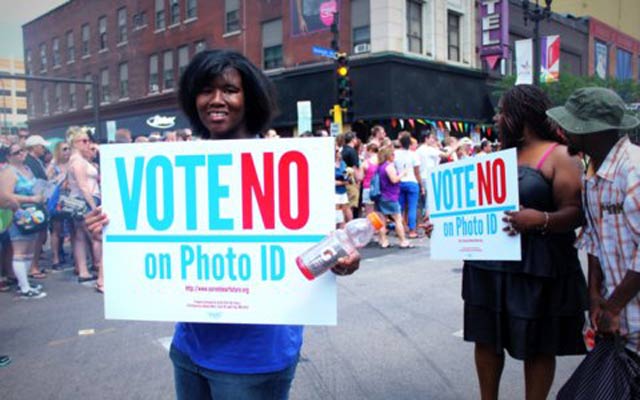
A coalition of groups led by the ACLU and the League of Women Voters made arguments in Minnesota’s Supreme Court yesterday against a ballot measure that would amend the state’s constitution to “require all voters to present valid photographic identification to vote.” The plaintiffs argue that the measure’s language obscures how the constitution would be changed. “Valid photographic identification” would only include those that were government-issued, and not other forms of ID, such as those issued by schools.
Minnesota remains one of only seven states that does not use a provisional ballot system. This measure would institute provisional voting, but lawyers argue that the measure is misleading because it makes no mention of the significant change to the way votes are counted when using provisional ballots.
The measure, which will be decided by voters in November if the state’s high court allows it, also requires “the state to provide free identification to eligible voters.” Yet those IDs wouldn’t exactly be free—at minimum, taxpayers would foot the bill, as would voters who would first need to obtain a $26 birth certificate and travel up to 100 miles to a Department of Vehicle Services office to apply for their ID.
The voter ID measure is supported by Minnesota Majority, which has been accused of using a racist ad to call attention to the imaginary problem of voter fraud. The ad in question features a black man in a prison uniform, and a mariachi musician waiting in line to vote.
The court is expected to issue its decision by August 27, so the secretary of state’s office will know whether to print up this fall’s ballots with the constitutional amendment proposal.
But not everyone’s waiting until the state’s Supreme Court decision to do something. I spoke with Miracle Randle by phone about her decision to begin working with TakeAction Minnesota’s Stop Photo ID campaign. A rising senior at Metropolitan State University in St. Paul, this 22-year-old feels she’s inherited a legacy of civil rights. I spoke to her while she was at the school library, where she was studying for a class she’s currently enrolled in, before she took off to a meeting to strategize about the campaign she’s working on. Randle works in a phone bank, as well as in groups of four people who go door-to-door to talk with potential voters about this fall’s ballot measure.
Popular
"swipe left below to view more authors"Swipe →
What drew you to do work against the voter ID ballot measure?
I learned about voter ID in February of this year. Before then, I didn’t understand what the bill was about, but I began researching it. I realized that if the amendment passes, everyone would need ID in order to vote—but there a lot of people in my community, in low-income communities, and homeless people who can’t afford ID. But everyone who’s eligible should be able to exercise their right to vote.
I’m currently taking a class on human rights for the summer term and my professor talked to us about voter suppression. After class, she told me about TakeAction and how I could get involved in the group, and I was very excited to finally be able to do something to help create change in Minnesota and in my particular community.
I grew up in Chicago, where the community is a foundation for everything, so I’m taking a community approach here to bring African-Americans together around this. And I’m getting my friends to join me, by phone banking or going door to door. Our future generations will be affected depending on how this measure goes.
You mentioned growing up in Chicago, which was a hotbed of civil rights activism fifty years ago. Do you see that generation’s work connecting to what you’re doing today?
Definitely. I grew up with my grandma, she raised me and took care of me, I have aunties who were part of the civil rights movement. And I think this is why I became involved in the effort against voter suppression. My aunties and my uncles marched for the right to vote for all of us—for my right to vote. And I don’t think it’s fair that one strike could overturn everything that they fought so hard for.
And this is about the suffragette movement before that, too. The women who came before me fought to make it our right to vote. And now this measure threatens that, because women who are escaping domestic abuse may not be able to vote if they don’t have a current and permanent address. So this could potentially suppress that vote as well. For me, it just hits close to home. And that’s why I’m working to defeat it in November.
How do people respond when you show up at their door? Or when you call them at home?
Some people are already set to vote against it and protect everyone’s right to vote—but some people still feel that everyone should simply have an ID. So my challenge becomes explaining how low-income people are limited in their ability to get the proper type of ID needed. I haven’t been especially successful yet, but I’m brand-new to organizing and campaigning. I started two months ago, and it can only get better.
This is my first time doing organizing, and I love it. I graduate next year and now I realize that this is what I want to do from here forward—work towards social justice by preventing voter suppression.
—Aura Bogado


